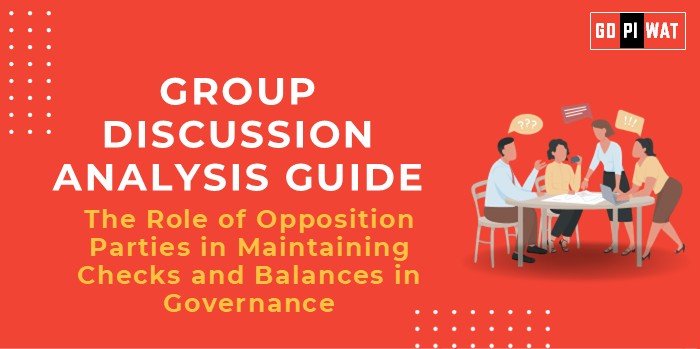📋 Group Discussion (GD) Analysis Guide
🌟 Topic: The Role of Opposition Parties in Maintaining Checks and Balances in Governance
🌐 Introduction
Opposition parties are the cornerstone of democracy, tasked with scrutinizing government policies, proposing alternatives, and ensuring accountability. Their role is integral in maintaining the equilibrium of power within governance frameworks, particularly in parliamentary democracies.
📊 Quick Facts & Key Statistics
- Global Freedom Index (2023): The Human Freedom Index highlights a decline in global freedom, with the average rating dropping from 6.79 in 2020 to 6.75 in 2021, impacting 89.8% of the world’s population.
- Indian Parliament: Opposition scrutinizes policies, debates critical issues, and offers solutions to uphold democratic principles.
- United Kingdom: The Leader of the Opposition serves as the “Prime Minister-in-waiting,” leading shadow cabinets to critique policies and ensure governance efficiency.
- United States: Opposition parties, often represented by the minority in Congress, influence legislation through debates and mechanisms like filibusters.
👥 Stakeholders and Their Roles
- Opposition Parties: Ensure accountability and act as alternative policy advocates.
- Government: Responds to opposition criticism and debates.
- Media: Amplifies opposition voices, facilitating public discourse.
- Citizens: Engage with opposition-led initiatives to strengthen democracy.
- Judiciary: Arbitrates disputes arising from opposition challenges.
🏆 Achievements and Challenges
✨ Achievements
- Policy Reforms: Enhanced legislation through opposition debates, such as the Indian GST amendments.
- Corruption Exposure: Opposition in Brazil revealed a $300M corruption scandal in 2021.
- Institutional Strengthening: The UK’s shadow cabinet system ensures comprehensive policy critique.
⚠️ Challenges
- Political Polarization: Stalling progress due to ideological conflicts.
- Suppression: Reduced operational freedom for opposition in many democracies.
- Credibility Concerns: Opportunistic alliances weaken public trust.
🌍 Global Comparisons
- Success: The UK and Canada utilize structured opposition frameworks to strengthen governance.
- Challenges: Emerging democracies often face suppression of opposition voices.
🚀 Effective Discussion Approaches
- Opening Approaches:
- Highlight global trends: “Over two-thirds of countries fail to meet freedom benchmarks, emphasizing the opposition’s role.”
- Contrast structured opposition roles in countries like the UK and India.
- Counter-Argument Handling: Use examples like U.S. filibusters, where opposition uses creative methods to influence policy.
📈 Strategic Analysis of Strengths & Weaknesses
- Strengths:
- Promotes policy accountability.
- Encourages informed public debates.
- Weaknesses:
- Potential for obstructionism.
- Resource constraints for smaller parties.
- Opportunities:
- Leveraging social media for outreach.
- Increasing bipartisan collaborations.
- Threats:
- Authoritarian tendencies.
- Public apathy towards opposition efforts.
🛠️ Structured Arguments for Discussion
- Supporting Stance: “The opposition is indispensable for a functioning democracy, as it prevents the concentration of power.”
- Opposing Stance: “Opposition tactics, such as filibusters, often delay crucial legislation and governance.”
- Balanced Perspective: “While opposition is crucial for checks and balances, its effectiveness depends on constructive engagement.”
💼 Connecting with B-School Applications
- Real-World Applications:
- Case studies on governance reform due to opposition pressure.
- Insights into leadership and negotiation strategies.
- Sample Interview Questions:
- How does opposition contribute to transparent policymaking?
- What lessons can governance reform due to opposition teach future leaders?
- Insights for Students:
- Opposition strategies offer lessons in leadership and adaptability.
- Understanding political checks and balances is essential for effective governance strategies.


